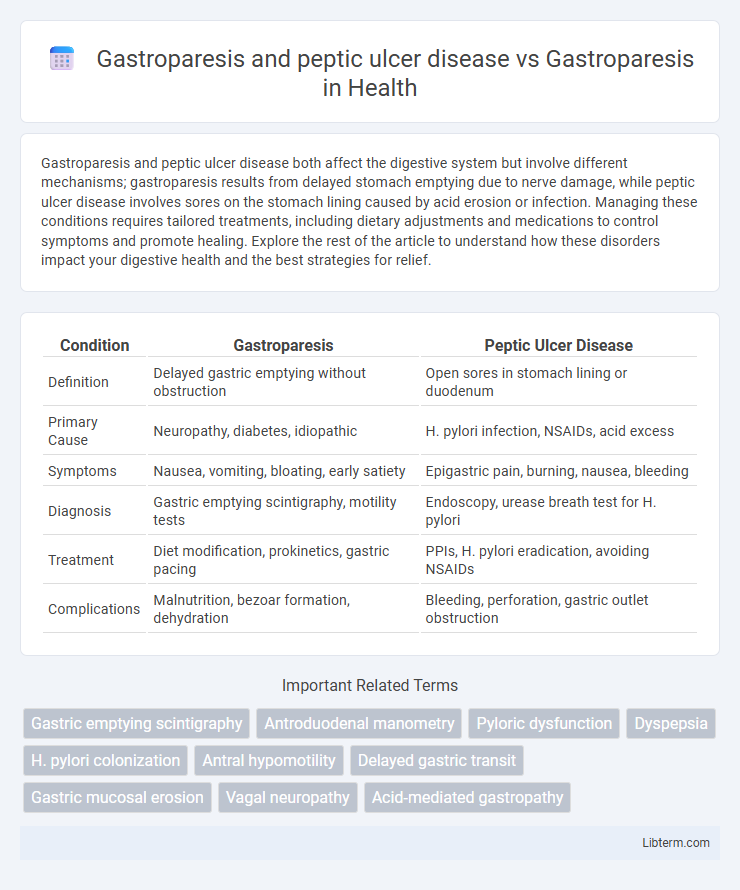Gastroparesis and peptic ulcer disease both affect the digestive system but involve different mechanisms; gastroparesis results from delayed stomach emptying due to nerve damage, while peptic ulcer disease involves sores on the stomach lining caused by acid erosion or infection. Managing these conditions requires tailored treatments, including dietary adjustments and medications to control symptoms and promote healing. Explore the rest of the article to understand how these disorders impact your digestive health and the best strategies for relief.
Table of Comparison
| Condition | Gastroparesis | Peptic Ulcer Disease |
|---|---|---|
| Definition | Delayed gastric emptying without obstruction | Open sores in stomach lining or duodenum |
| Primary Cause | Neuropathy, diabetes, idiopathic | H. pylori infection, NSAIDs, acid excess |
| Symptoms | Nausea, vomiting, bloating, early satiety | Epigastric pain, burning, nausea, bleeding |
| Diagnosis | Gastric emptying scintigraphy, motility tests | Endoscopy, urease breath test for H. pylori |
| Treatment | Diet modification, prokinetics, gastric pacing | PPIs, H. pylori eradication, avoiding NSAIDs |
| Complications | Malnutrition, bezoar formation, dehydration | Bleeding, perforation, gastric outlet obstruction |
Understanding Gastroparesis: Definition and Causes
Gastroparesis is a chronic digestive disorder characterized by delayed stomach emptying due to impaired gastric motility, often caused by diabetes, viral infections, or nerve damage affecting the vagus nerve. In contrast, peptic ulcer disease involves mucosal erosion in the stomach or duodenum primarily caused by Helicobacter pylori infection or long-term use of nonsteroidal anti-inflammatory drugs (NSAIDs), which does not directly affect gastric motility. Understanding gastroparesis requires focusing on the neuromuscular dysfunction leading to impaired gastric emptying, distinguishing it from peptic ulcer disease's structural mucosal damage.
Peptic Ulcer Disease Explained: Key Facts
Gastroparesis is a disorder characterized by delayed stomach emptying without an obstructive cause, leading to symptoms such as nausea, vomiting, and bloating. Peptic Ulcer Disease (PUD) involves the formation of sores or ulcers in the lining of the stomach or duodenum, primarily caused by Helicobacter pylori infection or prolonged NSAID use, resulting in abdominal pain and potential gastrointestinal bleeding. While gastroparesis disrupts gastric motility, PUD directly damages the mucosal lining, making their pathophysiologies and treatment approaches distinctly different.
Overlapping Symptoms: Gastroparesis vs Peptic Ulcer Disease
Gastroparesis and peptic ulcer disease share overlapping symptoms such as upper abdominal pain, nausea, and bloating, making differential diagnosis challenging. Both conditions can cause delayed gastric emptying and contribute to early satiety and vomiting, complicating symptom assessment. Accurate diagnosis requires careful evaluation of symptom patterns, endoscopic findings, and gastric motility studies to distinguish between the motility disorder of gastroparesis and the mucosal damage from peptic ulcers.
Distinguishing Gastroparesis from Peptic Ulcer Disease
Gastroparesis primarily involves delayed gastric emptying caused by vagus nerve dysfunction, leading to symptoms such as nausea, vomiting, and early satiety, while peptic ulcer disease is characterized by mucosal erosions in the stomach or duodenum causing localized epigastric pain and potential gastrointestinal bleeding. Diagnostic distinctions include gastric emptying studies necessary for Gastroparesis and endoscopic evaluation for identifying peptic ulcers. Treatment approaches vary, with prokinetic agents essential for Gastroparesis management and acid suppression therapy, including proton pump inhibitors, critical for peptic ulcer disease.
Diagnostic Approaches for Both Conditions
Diagnostic approaches for gastroparesis primarily involve gastric emptying scintigraphy, which measures the rate of stomach emptying and helps identify delayed gastric motility. In contrast, peptic ulcer disease diagnosis relies heavily on upper gastrointestinal endoscopy to visualize mucosal lesions and may include Helicobacter pylori testing through urea breath tests or biopsies. Both conditions may require additional imaging or manometry to evaluate associated gastrointestinal function and rule out other pathologies.
Pathophysiological Differences: Gastroparesis and PUD
Gastroparesis is characterized by delayed gastric emptying due to impaired gastric motility resulting from vagus nerve dysfunction or smooth muscle abnormalities, whereas peptic ulcer disease (PUD) involves mucosal erosion primarily caused by Helicobacter pylori infection or NSAID-induced gastric acid damage. Gastroparesis pathophysiology centers on neuromuscular dysfunction without mucosal injury, while PUD entails disruption of the mucosal barrier and inflammation leading to ulcer formation. The distinction lies in motility impairment in gastroparesis versus acid-mediated mucosal damage in PUD.
Treatment Strategies for Gastroparesis
Treatment strategies for gastroparesis primarily involve dietary modifications, prokinetic agents like metoclopramide, and antiemetic medications to manage symptoms and improve gastric emptying. In contrast, peptic ulcer disease requires acid-suppressive therapy with proton pump inhibitors, along with eradication of Helicobacter pylori if present, addressing the underlying cause rather than motility issues. Combining treatments for gastroparesis with peptic ulcer management necessitates careful consideration to optimize symptom control and prevent drug interactions.
Managing Peptic Ulcer Disease: Current Therapies
Managing peptic ulcer disease in patients with gastroparesis involves targeted therapies such as proton pump inhibitors (PPIs) and H2 receptor antagonists to reduce gastric acid secretion and promote ulcer healing. Eradication of Helicobacter pylori infection using combination antibiotic therapy is critical to prevent ulcer recurrence and complications. Careful management of gastroparesis symptoms alongside ulcer treatment ensures improved gastric motility and reduces the risk of delayed ulcer healing.
Combined Challenges: When Both Conditions Coexist
Gastroparesis and peptic ulcer disease present combined challenges when coexisting, as delayed gastric emptying exacerbates ulcer-related symptoms and complicates medication absorption. The impaired motility in gastroparesis hinders effective healing of peptic ulcers by prolonging gastric acid exposure to the mucosa. Management requires tailored treatment strategies targeting both delayed gastric emptying and ulcer prevention to reduce the risk of complications like perforation and bleeding.
Prognosis and Quality of Life Considerations
Gastroparesis significantly impairs gastric emptying, leading to chronic nausea and malnutrition, which worsens prognosis and drastically reduces quality of life compared to peptic ulcer disease, where effective treatment usually results in symptom resolution and minimal long-term impact. Peptic ulcer disease, often caused by Helicobacter pylori infection or NSAID use, has a relatively favorable prognosis with appropriate antibiotic and acid suppression therapy, allowing patients to maintain normal daily activities. Gastroparesis management focuses on symptom control and nutritional support, but persistent symptoms frequently cause substantial lifestyle limitations and psychosocial stress.
Gastroparesis and peptic ulcer disease Infographic

 libterm.com
libterm.com